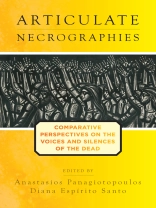Going beyond the frameworks of the anthropology of death, Articulate Necrographies offers a dramatic new way of studying the dead and their interactions with the living. Traditional anthropology has tended to dichotomize societies where death “speaks” from those where death is “silent” – the latter is deemed “scientific” and the former “religious” or “magical”. The collection introduces the concept of “necrography” to describe the way death and the dead create their own kinds of biographies in and among the living, and asks what kinds of articulations and silences this in turn produces in the lives of those affected.
Jadual kandungan
Introduction
Anastasios Panagiotopoulos and Diana Espírito Santo
PART I: NECROGRAPHIC FRAMEWORKS
Chapter 1. Voices and Silences of the Dead in Western Modernity
Tony Walter
Chapter 2. Coping with Massive Urban Death: The Mutual Constitution of Mourning and Recovery in World War Two’s Bombing War
Antonius C.G.M. Robben
Chapter 3. Biographies and Necrographies in Exchange: From the Self to the Other
Anastasios Panagiotopoulos
PART II: NECROGRAPHIC OBSERVATIONS
Chapter 4. The Making of Spirit Bodies and Death Perspectives in Afro-Cuban Religion
Diana Espírito Santo
Chapter 5. Sensory Necrography: The Flow of Signs and Sensations in the Corpse
Beth Conklin
Chapter 6. Unanchored Deaths: Grieving the Unplaceable in Samburu
Bilinda Straight
Chapter 7. The Sociality of Death: Life Potentialities and the Vietnamese Dead
Marina Marouda
Chapter 8. Enlightened Spirits: A Historical-anthropological Perspective on Spiritism, Science, Modernity and the Vitality of Spirits under Neoliberalism
Raquel Romberg
Chapter 9. Channeling the Flow: Dealing with Death in an African-based Religion
Gabriel Banaggia
Chapter 10. Of Shadows and Fears: Nepalese Ghost Stories from Classical Texts and Folklore to the Social Media
Davide Torri
Chapter 11. Death isn’t What it Used to Be: Animist and Baptist Ontologies in Tribal India
Piers Vitebsky
Afterword: The Necrographic Imagination
Magnus Course
Index
Mengenai Pengarang
Diana Espírito Santo is currently Assistant Professor of Social Anthropology at the Anthropology Program, Pontificia Universidad Católica de Chile. She has worked on Afro-Cuban forms of spirit mediumship and Afro-Brazilian religions. Her recent publications include Developing the Dead: Mediumship and Selfhood in Cuban Espiritismo (University Press of Florida, 2015).












